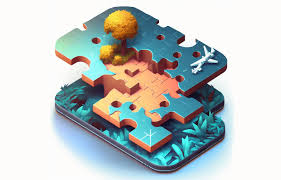Puzzle games are a genre of video games that challenge players with problem-solving tasks, logical reasoning, and strategic thinking. These games can range from traditional jigsaw puzzles to complex brain teasers and intricate story-driven challenges. The core gameplay typically involves manipulating objects, deciphering codes, or completing patterns to achieve specific goals, often requiring players to think critically and creatively.
Characteristics of Puzzle Games
- Variety of Mechanics: Puzzle games may incorporate different mechanics, including matching colors or shapes, solving riddles, navigating mazes, or arranging tiles. Popular mechanics are found in games like Tetris, Candy Crush, and Portal .
- Levels of Difficulty: They often feature escalating difficulty levels, presenting new challenges as players progress, which keeps the gameplay engaging and rewarding .
- Cognitive Skills: Playing puzzle games can improve various cognitive skills, including memory, pattern recognition, and critical thinking. They can also enhance hand-eye coordination and spatial awareness .
Historical Context
Puzzle games have a long history, dating back to early board games and simple logic puzzles. The rise of computer and mobile gaming has popularized this genre, with many modern titles featuring rich narratives and innovative gameplay mechanics that appeal to a broad audience.
Overall, puzzle games provide an enjoyable way for players to challenge their minds and develop problem-solving skills while offering a satisfying sense of accomplishment upon completing tasks. For more information on the history and impact of puzzle games, you can check out articles on and .












